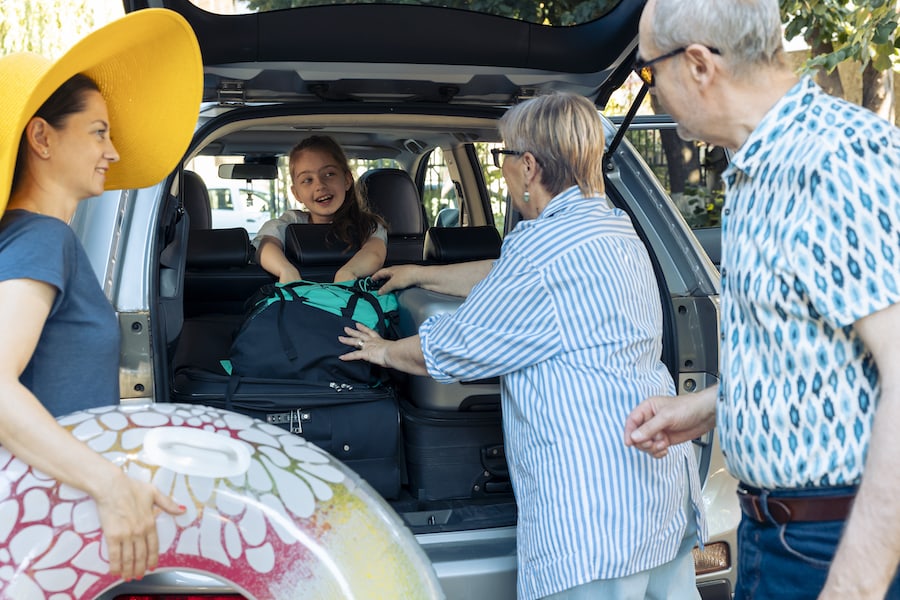During my time as a Federal Air Marshal (FAM), I logged over 2.4 million air miles and spent countless hours in over twenty countries. Needless to say, during the many days and nights I was gone from home, there were plenty of times when my attention was drawn away from work due to some unforeseen incident at home. When having fun is your main priority, letting distractions pull you out of the moment can really ruin things; that's why I'm such a stickler for contingency planning. Now that I've retired, I've learned that the same process I used for contingency planning as a FAM can also be applied to family vacations.
As the old saying goes, "If something can go wrong, it will." No one likes to think that way when planning their vacation, but it's crucial to develop standardized emergency responses well in advance of your travel. Things like medical emergencies, separation from family members, stolen luggage, and the risks of getting stranded all have to be considered. Contingency planning is nothing more than anticipating the possible problems you may encounter during your vacation and devising plans to minimize the impact of those problems. Making a contingency plan consists of five steps:
- Identify the security risks at each stage of your travel. Remember to keep your focus on those things that impact safety.
- Prioritize risks based on severity and likelihood. The chances of becoming separated in a crowd are much more likely than the chances of a terror attack, so start planning for the most likely incidents first.
- Develop plans to address those risks while minimizing their impact on your trip. Keep your plans simple.
- Brief the other members of your party on all emergency plans. If you're traveling with young children, be sure to keep them informed, but not to the point of making them afraid.
- In the event of an emergency, monitor the effectiveness of your plan and create new ones as the need arises. As the old saying goes, plans are nothing more than a point from which to deviate when things go wrong. Be flexible in your planning and remember that even the best-laid plans will need to change if you find them ineffective.
Three Important Contingency Plans
Now that you understand what contingency planning is, let's look at three situations you may find yourself in that may require some pre-planning. We'll start with the most common—separation from your group.
- Separation is probably one of the most common “emergencies” families face while vacationing, especially if you're traveling with smaller children. Places like public beaches, parks, music venues, and shopping centers are full of distractions that can draw attention away from what’s most important—sticking together. Here are a few things you should cover with everyone before you begin your trip:
- Establish an agreed-upon meeting point before leaving your hotel room. If you become separated from your group, get there quickly and don’t let anyone distract you.
- If no meeting point was established, freeze—moving around too much could cause you to become more lost.
- Let younger children know they shouldn’t be afraid to yell your name. You’ll be shouting their name too until you’re reunited.
- Start looking for the "good guys." If it's taking too long to find your group, start looking for someone like a park employee or security officer who can help.
These four simple steps can make a stressful situation much less problematic. Still, you must let your younger children know that you will work diligently to reconnect if you get separated. Separation from the group isn't as frightening with older children. They usually have cell phones and, naturally, want to strike off on their own. But for your own sanity, parents should establish preset meeting times and places to have their teens “check in” or set mandatory call times so that you know they're okay.
- Identify local hospitals and drug stores near where you’ll be staying.
- Contact your health insurance provider to see what type of coverage you have in the area you’ll be staying.
- Research any mandatory or recommended vaccinations that may be required and ensure you’re up to date on your shots.
- Pack a basic first-aid kit. Be sure to include items such as Imodium for upset stomachs and anti-nausea medications for travel sickness.
- Make sure you pack enough prescription medications to cover your trip and a few extra days to be safe.
- Find a local grocery store to stock up on fresh water and sunscreen.
Not all medical emergencies are as severe as what happened to my friend, but these six simple steps will keep you prepared for most of the medical issues you may face while you’re away.
- Make sure someone back home, a friend, family member, or trusted neighbor, has your contact information. That way, they can get in touch with you should something need to be addressed back home.
- When you book your travel tickets, be sure to pay for the travel insurance that comes with them. That way, if your plans have to change or your vacation gets cut short, you can avoid the hassle and fees that come with trying to change a nonrefundable ticket.
- Before you leave, make sure you have basic home maintenance numbers programmed into your phone: plumbers, electricians, and general handyman services. If a pipe breaks back home or the water heater goes on the fritz, you’ll want to complete the repairs immediately.
Knowing what’s happening back home helps to put your mind at ease and allows you to relax. It also frees up a little of the mental bandwidth you need to keep tabs on what’s happening around you. That’s important because situational awareness is imperative to your safety when you and your family are in unfamiliar territory.
Those are only three issues you may have to develop contingency plans for when traveling, but there are plenty more. Delays, cancelations, loss of money or resources, all of these things are possibilities. What’s important is that you acknowledge the fact that, although rare, these things can happen and need to be planned for. If you have a response to emergencies planned out in advance, your reaction and resolution will be much quicker, giving you more time to relax and enjoy yourself once everything is dealt with. Besides, that’s why we take vacations in the first place, isn’t it—to relax? Now that you have a little information on contingency planning and how it plays into your vacation, that part should be much easier, so get out there and have a great time. You deserve it!
The above is an original article by Gary Quesenberry. His latest book, Spotting Danger for Travelers: Build situational awareness to keep safe while traveling, will be published April 2023, YMAA Publication Center, ISBN: 9781594399305





